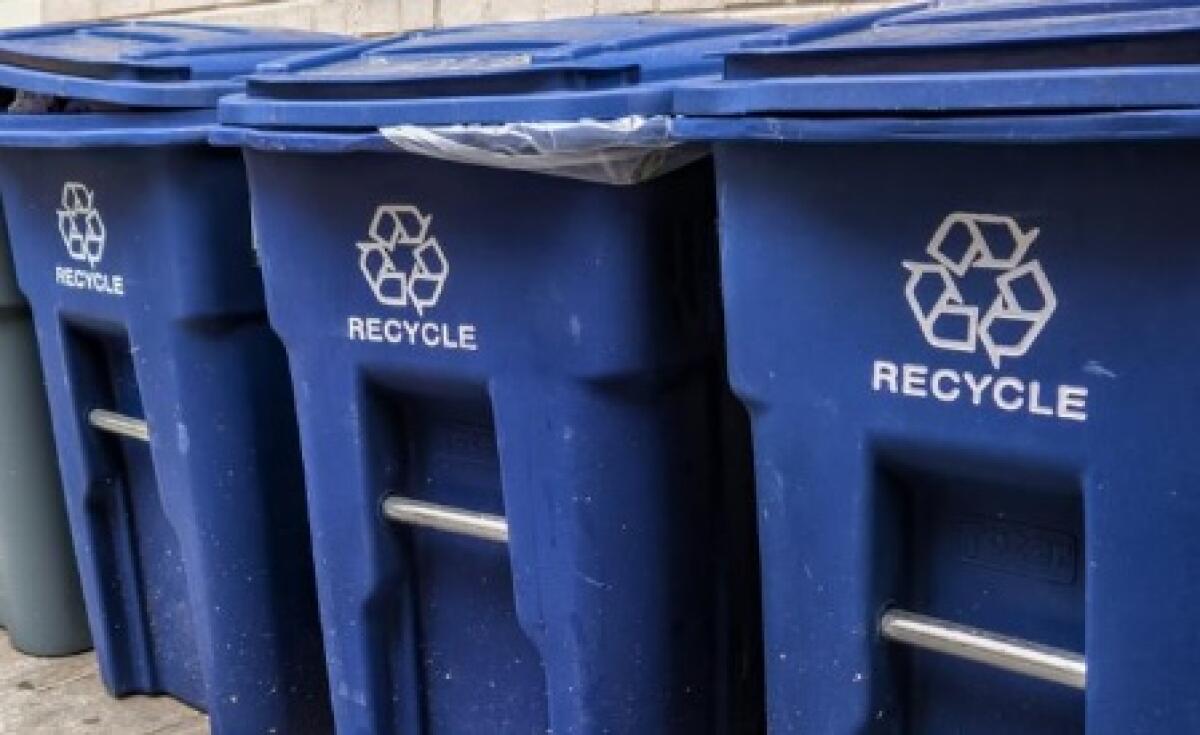Costa Mesa begins overhauling waste collection, food recovery to meet state goals by 2025

- Share via
Costa Mesans will soon have to ponder sustainability at the can — deciding whether to trash, recycle or compost food and refuse — after the City Council Tuesday voted to approve trash hauler agreements as part of a state-mandated overhaul of municipal waste processing.
Council members agreed to appropriate up to $175,000 to implement the requirements of Senate Bill 1383, a measure that aims to reduce the amount of organic waste going into California landfills by 75% — the equivalent of about 20 million tons — by 2025. Its mandates take effect Jan. 1.
The measure requires cities to create residential and commercial recycling programs for organic waste such as food, paper, landscaping material and untreated lumber. Currently, Costa Mesa trash is separated not by residents, but at a sorting facility.
Cities must also establish food recovery programs to increase donations of unused edible items to food insecure individuals by 20% and procure .08 tons of recycled organic products — such as mulch, compost material or renewable natural gas — per resident each year.
San Juan Capistrano-based consultant Mike Balliet said expanding agreements with the multiple trash haulers that currently serve the city, to include provision of the required receptacles, a public education campaign and compliance monitoring program, would help Costa Mesa meet the mandates.
“Haulers are the make-sense partners for a lot of these provisions and programs,” Baillet said Tuesday. “But we need contractual obligations.”
Costa Mesa officials are considering citywide organic waste recycling to comply with the state’s SB 1383, which aims to reduce landfill waste 75% by 2025. Non-compliance could cost $10,000 per day.
Participating companies would pay a collective administrative compliance fee of $120,000 per year, based on their share of city business. Another $230,000 annually is anticipated come from an increase in service fees.
That revenue will help cover the city’s annual costs, which include $100,000 in staff and consultant time, $200,000 to establish and support a renewable materials procurement program and $50,000 to create a food recovery program.
Baillet said Costa Mesa residents would likely see an average bill increase of about 10%, much lower than statewide estimates forecasting hikes of 25% to 45%. Because the city contracts with multiple haulers, competition between them will help keep prices lower.
The biggest impact, he said, will be on residents.
“Up until now, they’ve been exempted from having to recycle their food waste,” Baillet said. “On Jan. 1, 2022, that goes away. So, these programs have to be rolled out.”
Following a two-year “education period,” failure to comply with the state mandates could subject the city to daily fines of up to $10,000.
Councilman Jeff Harlan said a robust educational campaign would be needed to spread the word to residents and businesses that trash habits have to change.
“We’re going to have to come up with ways to communicate with the public this is the state mandate, here’s what has to be done and here’s the way we’re going to aid and assist that from the city standpoint,” he said.
Energy and Sustainability Services Manager Salem Afeworki agreed.
“There’s going to be a big need for behavioral change — this is going to be a big undertaking,” she said. “But we’re trying to leverage our existing work, existing partnerships and work on it.”
All the latest on Orange County from Orange County.
Get our free TimesOC newsletter.
You may occasionally receive promotional content from the Daily Pilot.







